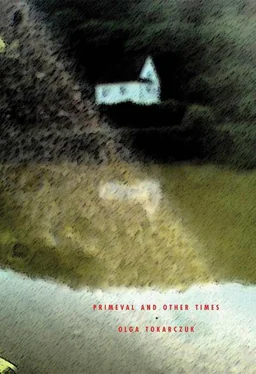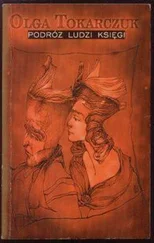He lay there for a month, not so much out of pain or weakness, as because the facts he had been trying to forget for the past few years were back – that the world was ending, and reality was disintegrating like rotten wood, matter was being eaten away from underneath by mould, it was happening quite senselessly and was meaningless. The squire’s body had given up – it too was disintegrating. The same thing had happened to his will. The time between making a decision and taking action kept bloating and becoming unendurable. Squire Popielski’s throat was swollen and stifled. It all meant that he was still alive, that various processes were still going on in his body, his blood was flowing, and his heart was beating. “It has caught up with me,” thought the squire, and from his bed he tried to fix his vision on something, but his vision had become sticky: it wandered about the furniture, landing on them like a fly. Plip! It landed on a pile of books that the squire had had brought to him but hadn’t read. Plip! a bottle of medicine. Plip! a stain on the wall. Plip! the view of the sky through the window. He found it tiring to look into people’s faces. They seemed so mobile, so volatile. It took a lot of vigilance to look into them, but Squire Popielski didn’t have the strength for vigilance, so he averted his gaze.
Squire Popielski had a crushing, ghastly feeling that the world, and everything that was good and bad in it, was passing him by: love, sex, money, thrills, distant voyages, beautiful pictures, intelligent books, wonderful people – all this was gliding past. The squire’s time was slipping away. Then in sudden despair he felt a desire to break free and rush off somewhere. But where, and what for? He fell onto the pillows and choked back his unwept tears.
And once again the spring brought him some hope of salvation. Once he had started to walk, admittedly on a cane, he stood by his favourite pond and asked himself the first question: Where do I come from? He stirred anxiously. Where did I come from, where is my beginning? He went home and made an effort to force himself to read – about the ancient world and prehistory, about excavations and Cretan culture. About anthropology and heraldry. But all this knowledge took him nowhere, so he asked himself a second question: What can a person actually know? And what are the benefits of acquired knowledge? And can you know something fully? He thought and thought, and on Saturdays he discussed the matter with Pelski, who came to play bridge. Nothing resulted from these discussions and reflections. With time he no longer felt like opening his mouth. He knew what Pelski would say, and he knew what he himself would say. He felt as if they were always talking about the same thing, repeating their questions, as if they were playing roles, like moths coming closer to a lamp and then shying away from the obvious truth that might burn them. So finally he asked himself a third question: What should a person achieve, how should he live, what should he do, and what not? He read Machiavelli’s The Prince , and books by Thoreau, Kropotkin, and Kotarbinski. All summer he read so much that he hardly ever left his room. Worried by this, one evening his wife went up to his desk and said:
“They say that rabbi from Jeszkotle is a healer. I went to see him and I asked him to come and visit us. He agreed.”
The squire smiled, disarmed by his wife’s naivety.
The conversation did not turn out the way he had imagined it. Along with the rabbi came a young Jew, because the rabbi could not speak Polish. Squire Popielski had no wish to confide his sufferings in this bizarre couple. So he asked the old man his three questions, though to tell the truth, he wasn’t counting on an answer. The young man with sidelocks translated the clear, lucid Polish sentences into the rabbi’s tortuous, throaty language. Then the rabbi surprised the squire.
“You collect questions. That’s good. I have one more, final question for your collection: Where are we heading? What is the goal of time?”
The rabbi stood up. In parting he offered the squire his hand in a very well-bred manner. Moments later he made another strange remark from the doorway, and the boy translated:
“The time for some tribes is coming to an end. Therefore I will give you something that should now become your property.”
The squire was amused by the Jew’s mysterious and solemn tone. For the first time in months he ate his dinner with an appetite and made fun of his wife.
“You’re resorting to all manner of sorcery to cure me of my arthritis. Evidently the best medicine for ailing joints is an old Jew who answers a question with a question.”
For dinner there was carp in aspic.
Next day the boy with sidelocks came to see the squire and brought him a large wooden box. Intrigued, the squire opened it. Inside there were some compartments. In one lay an old book with a Latin title: Ignis fatuus, or an instructive game for one player .
In the next compartment, which was lined in velvet, lay a birch-wood octagonal die. On each face it had a different number of spots, from one to eight. Squire Popielski had never seen a die like this one before. In the remaining compartments lay some little brass figurines of people, animals, and objects. Underneath he found a piece of cloth, folded over and over and frayed at the edges. More and more amazed by this bizarre present, he unfolded the cloth on the floor, until it took up almost the entire empty space between his desk and the bookcases. It was a sort of game, a sort of ludo in the form of a huge, circular labyrinth.
THE TIME OF DIPPER THE DROWNED MAN
The Drowned Man was the soul of a peasant called Dipper. Dipper had drowned in the pond one August, when the vodka he had drunk thinned his blood too much. He was on his way back by cart from Wola when his horses were suddenly startled by moon shadows and overturned the cart. The peasant had fallen into the shallow water, and the horses had gone off in confusion. The water at the edge of the pond was warm, thanks to the August sunshine, and Dipper felt good lying in it. When the warm water got into the drunken Dipper’s lungs, he groaned, but he didn’t sober up.
Trapped in his drunken body, his intoxicated soul, a soul that hadn’t been absolved, with no map of the road onwards to God, remained like a dog by the body going cold in the bulrushes.
Such a soul is blind and helpless. It keeps stubbornly returning to the body, because it knows no other form of existence. Yet it pines for the land it comes from, where it once used to be and from which it has been expelled into the material world. It remembers it, reminisces, laments and pines, but it does not know how to get back there. It is carried on waves of despair. Then it abandons the now rotting corpse and tries to find the way on its own. It wanders about crossroads and wayside inns and tries to cadge rides by the highways. It takes on various forms. It enters into animals and things, sometimes even barely conscious people, but it never manages to settle anywhere. In the material world it is an outcast, and nor does the spirit world want it either. For to enter the spirit world it needs a map.
After this hopeless wandering the soul returns to the body or to the place where it left the body. But for it the cold, dead body is what the charred remains of a house are for a living person. The soul tries to get the dead heart and the dead, lifeless eyelids moving, but it hasn’t enough strength or determination. In keeping with divine order, the dead body says: No. Thus the person’s body becomes a hated home, and the site of the body’s death the soul’s hated prison. The Drowned Man’s soul rustles in the reeds, simulates shadows and sometimes borrows a shape from the mist, thanks to which it tries to make contact with people. It can’t understand why people avoid it, why it strikes terror in them.
Читать дальше












